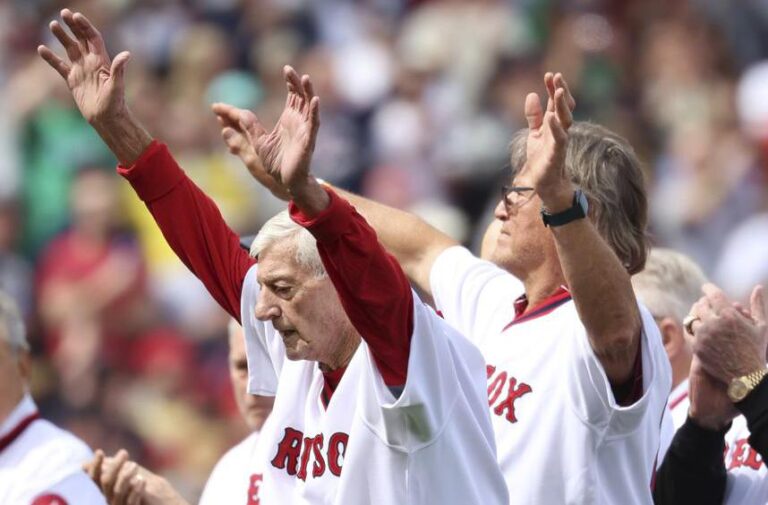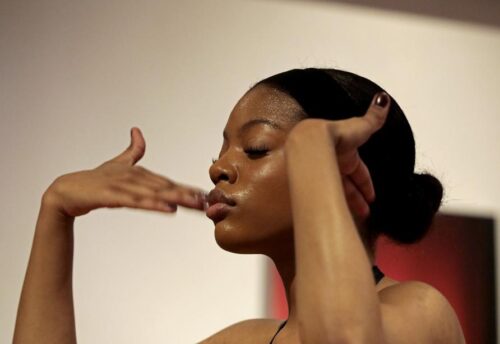There they were on Opening Day, the doddering survivors of the 1975 Red Sox: Bill Lee, Carlton Fisk, Fred Lynn, and many others. A stooped, 85-year-old Carl Yastrzemski was pressed into service to toss an anemic 25-foot lob (“first pitch’’) to manager Alex Cora.
Watching the senescent veterans shuffle unsteadily across the outfield grass, one could be forgiven for thinking: Who invited the zombie grandpas?
Trotting out Yaz to jump-start the boomer pacemakers was almost as ghoulish as the night in 1999 when Major League Baseball carted out 80-year-old Ted Williams to open the All-Star game. Williams could barely stand up.
Thanks to the science of cryogenics — portions of Williams’s body are reportedly frozen in an Arizona life-extension lab — there is always hope of a Second Coming. A real treat for the Fenway Faithful!
Hardly had we shaken off the dust from Opening Day than we were greeted by the inevitable, garment-rending remembrances of the 2013 Marathon bombing. I well remember the civic trauma, and my heart goes out to the survivors and the many injured.
Having said that, a bombing that claimed three fatalities in Gaza or Ukraine wouldn’t cause anyone to cancel a day at the beach. “Hundreds killed in Darfur in the past week alone,’’ said a Globe story.
You would think it’s time to move on. But we won’t. Boston is the city that is always looking back, never looking forward — “a winter city,’’ as the embittered ex-Bostonian Elizabeth Hardwick called it in a famous 1959 essay. Hardwick reviled Boston as a musty antiques barn that “attracted men of quiet and tasteful opinion, men interested in old families and things, in the charms of times recently past.’’
Don’t get me wrong. I love Boston history. I think it’s grand that people dress up as redcoats and rebel militia to reenact the primal events of our successful Revolution. This is a great city, a cradle of America’s industrial revolution, once the headquarters of militant abolitionism, a town that once credibly claimed to be the “Athens of America.’’ Ho Chi Minh worked at the Parker House, Martin Luther King got his PhD here, Malcolm X got turned on to books here: What’s not to love?
It’s the mawkish sentimentality of manufactured nostalgia that rankles me.
To be fair, some progress has been made. We seem to have finally shucked off the Kennedys, and none too soon, as the thinning of the bloodline becomes all too apparent. For the first time in years, I’m not aware of some literary or movie project seeking to capitalize on the glory years of the Winter Hill Gang or Boston’s answer to Robin Hood, James “Whitey’’ Bulger.
And, after three solid years of stultifying Brady-Belichick-Kraft programming, my beloved sports talk radio seems to have finally moved on to more pressing concerns, e.g., how Mike Vrabel will mess up the NFL draft and how the Celtics will run the table in the National Basketball Association playoffs.
Good luck with that.
By way of self-torture, I have watched a few episodes of the HBO series “Celtics City,’’ a shot-through-gauze remembrance of Boston’s basketball glory days — Red, Russ, Couz, Larry — weren’t they marvelous, blah blah blah. Yes, I admit that the Reggie Lewis segment was tragically moving. Sportswriter Jackie MacMullan was choking up on screen, and I was tearing up in my living room.
In the first episode, the producers stuck a microphone in the face of a contemporary Causeway Street fanatic, who insisted that “Bill Russell is in the house, Johnny Most is in the house, Red Auerbach is in the house.’’
His conclusion? “The ghosts are out, you can feel it.’’ Yes, I can feel it all too well.
Alex Beam’s column appears regularly in the Globe. Follow him @imalexbeamyrnot.

